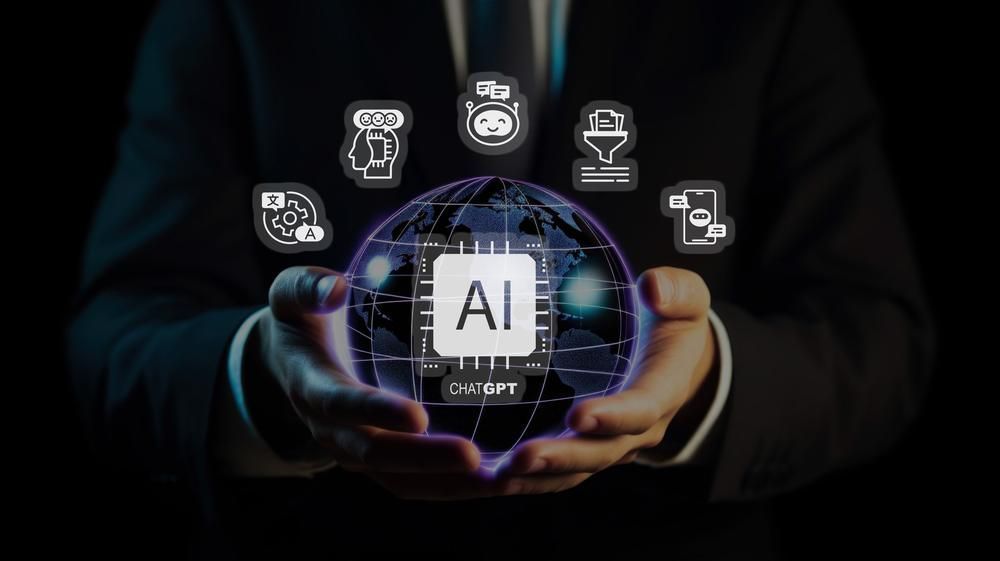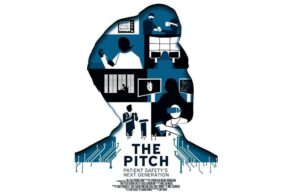Artificial Intelligence in Healthcare Simulation
Artificial intelligence (AI) in healthcare simulation based education is relatively new, yet here to stay and constantly be developed. AI in medical and AI in nursing based education are changing the forefront of technology based healthcare simulation educational modalities. AI in healthcare simulation improves learner experiences and clinical skill development prior to clinical practice.
AI is a computer science field which has a focus on the creation of both algorithms and software that are similar in the way humans think and also make decisions. AI has rapidly emerged today due to the advancement of algorithms and computer softwares. AI has become a part of healthcare education and will continue to expand into more medical, nursing and healthcare organizations and institutions across the world.
AI has the ability to be able to support healthcare staff in their education in a number of different ways. The ways in which AI is able to provide education includes: direct education, supportive education, and also empowerment of the learner. The integration of AI tools into medical, healthcare and nursing education can enhance learners’ knowledge, develop a number of skills, and also the ability to make sense of complex medical concepts for the learner.
Sponsored Content:
Virtual Patients Are Able to Provide Real Time AI Feedback for Learners
Virtual patients are an interactive computer based healthcare simulation for health professionals education. Virtual patients are an AI based computer program which can show symptoms and are able to respond to learners’ interventions in real time. The learner has the role of healthcare professional and has the experience to gain clinical information and also suggest diagnosis, management, and then decide on required patient follow up. Virtual patients also allow learners to be able to practice communication skills as the AI based program gives learners communicative feedback in real time.
View the LEARN CE/CME Platform Webinar Why Healthcare Needs AI Now: Use Cases and Examples to learn more!
Chatbots Provide AI Based Immediate Response to Healthcare Learners Needs
Sponsored Content:
AI based chatbots are computer software systems that have been programmed to be able to read and also appropriately respond to learner related information provided. The vast majority of learners will own a smartphone or similar. Chatbots are able to be used as a program to assist in education. Chatbots have the capability to be able to create life like written conversation. In medical education a chatbot can be useful for a number of time consuming tasks. These include tasks such as the creation of a summary or evaluation of research.
AI Based Intelligent Tutor Systems Instead of One on One Tutoring for Learners
Intelligent tutor systems (ITS) are an AI based instructor system which aims to provide similar outcomes of one on one in person tutor. ITS algorithms have the ability to be able to analyze data of any historical performances and knowledge acquisition styles. Based on data, algorithms are able to identify knowledge gaps and create tailored education experiences that are able to be adapted to learner needs. This is done by AI in place of an in person tutor.
AI games offer customized and immersive learner experience for medical and nursing learners. AI games have the ability to adjust speed and difficulty of the game based on learner performance. Gamification of the learning in the healthcare environment increases learner engagement and has been shown to improve learning outcomes.
Virtual Reality as An AI Healthcare Simulation Education Tool
Virtual reality (VR) is an immersive and interactive experience generally provided by an AI based software in a headset. Individuals or groups of learners can undertake provision of clinical care or procedural skills to patients in a virtual environment. VR is a way in which gamification is able to be provided by an AI based computer system for learners. VR is able to provide real time feedback in visual, auditory and haptic based sensations for learners. VR is an immersive educational environment through which AI is utilized to enhance the learners experience and make VR a more intuitive experience.
AI also has the ability to be useful in the analysis of in person healthcare simulation recordings of scenarios. AI can be used to analyze and create reports of specific data points in relation to the recorded healthcare simulation scenario. This data can then be utilized to formulate safety reports for organizations as well as many other uses to come in the future.
Companies in the AI Industry for Healthcare Simulation Products
There are a number of Large Language Models (LLMs) or AI based chatbots. Some examples include: ChatGPT, LLama 2, Bard, Aleph Alpha, and Claude. These AI based chatbots have
brought forward new tools that have created innovation across a number of different industries.
ChatGPT was made by Open AI and Bard is Google’s equivalent. ChatGPT has been out since November of 2022, while Bard was just released in March 2023.
Nasco Healthcare Presents ALEX and AXEL to Deliver AI Based Clinical Simulation
ALEX is one of two Nasco healthcare simulators that are for learners to be able to practice communication through AI in an in person clinical simulation. ALEX is a patient simulator connected to a cloud that uses speech recognition along with AI and has voice responses in Spanish, French, German, and English. ALEX is a scenario driven yet instructor controlled healthcare simulation patient simulator. ALEX has virtual AED/Pacing and 12-lead ECG.
AXEL is the second AI based patient simulator by Nasco healthcare. Axel is also a cloud based patient simulator with computerized functionality. A software subscription is required, which is included with the purchase for the product’s lifetime. AXEL is also a scenario driven yet instructor controlled simulator. AXEL assists with patient to learner communication with an internal microphone and speakers which respond in real time. AXEL, similar to ALEX, also includes virtual AED/Pacing and 12 lead ECG.
PCS Spark Created an AI Based Virtual Patient
PCS has a few different products which have AI driven capabilities. PCS Spark has a number of virtual digital patient personas which have personal concerns, health history, and expected findings to discuss in a clinical interview. There are a number of diverse and expansive patient scenarios crafted by industry experts and former standardized patient educators. PCS Spark digital patients can comprehend over 30,000 learner questions and also can respond to scenario specific responses.
SimVox, is the AI speaker which is also from PCS adds AI based patient communication technologies to any low fidelity manikins. PCS has introduced a similar concept to Amazon’s Alexa, albeit for healthcare simulation enthusiasts. SimVox is the smart AI based speaker for a human patient simulator. The use of a low or high fidelity healthcare simulation manikin can be improved with SimVox. SimVox enhances most clinical simulation experiences with placement just behind the clinical simulation manikins neck.
Lumeto Expands to InvolveXR VR with Customizable AI Based Conversation
Lumeto lives and breathes AI based technology and has brought to life a fully immersive and highly customizable VR Simulation Lab. InvolveXR is a VR-based education modality that has been increasing in popularity. Virtual patients which are able to respond to learners intuitively with AI based technology are increasingly popular as clinical simulation based education modalities.
SimConverse in Process to Utilize AI to Improve Clinical Communication Skills
SimConverse has developed a generative AI platform to assist in the improvement of healthcare professionals’ communication skills with virtual simulation experiences. SimConverse offers an ever growing library with more than 1000 AI characters that healthcare learners can hone their communication skills with. Communication errors are linked to up to 80% of serious healthcare related errors. Here SimConverse offers a communication based solution for education of these skills with AI technology.
AI based technology continues to grow and develop in all kinds of fields. AI in healthcare simulation education is a rapidly evolving area with much hope to assist with many areas of healthcare simulation. AI increases the depth of learning for those learners in both the virtual and in person healthcare simulation scenarios.
AI in Clinical Simulation Latest News

Summer Watching: Best of Healthcare Simulation Webinars 2024 So Far

Global Medical Simulation Industry News Update June 2024

Healthcare Simulation Research May 2024
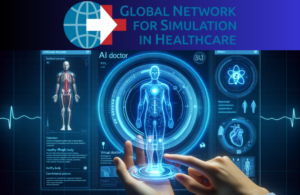
GNSH April 25th Virtual Event: Renaissance of Healthcare Simulation Through AI
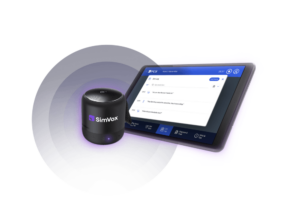
Early Adoption of PCS SimVox AI Speaker Deemed Invaluable for FSU
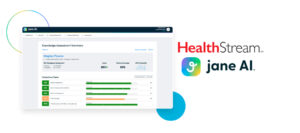
HealthStream’s jane AI – Individualized Competency-Based Validation and Assessment Program

Global Medical Simulation News Update March 2024

2023’s AI Recap for Medical Simulation
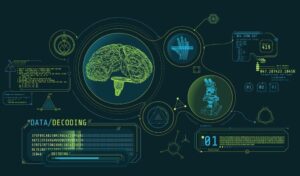
Revolutionizing Healthcare Simulation: ChatGPT’s Impact and Implications
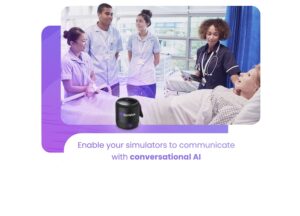
Make Your Low Fidelity Manikin Smart with SimVox AI Speaker
Sponsored Content:



